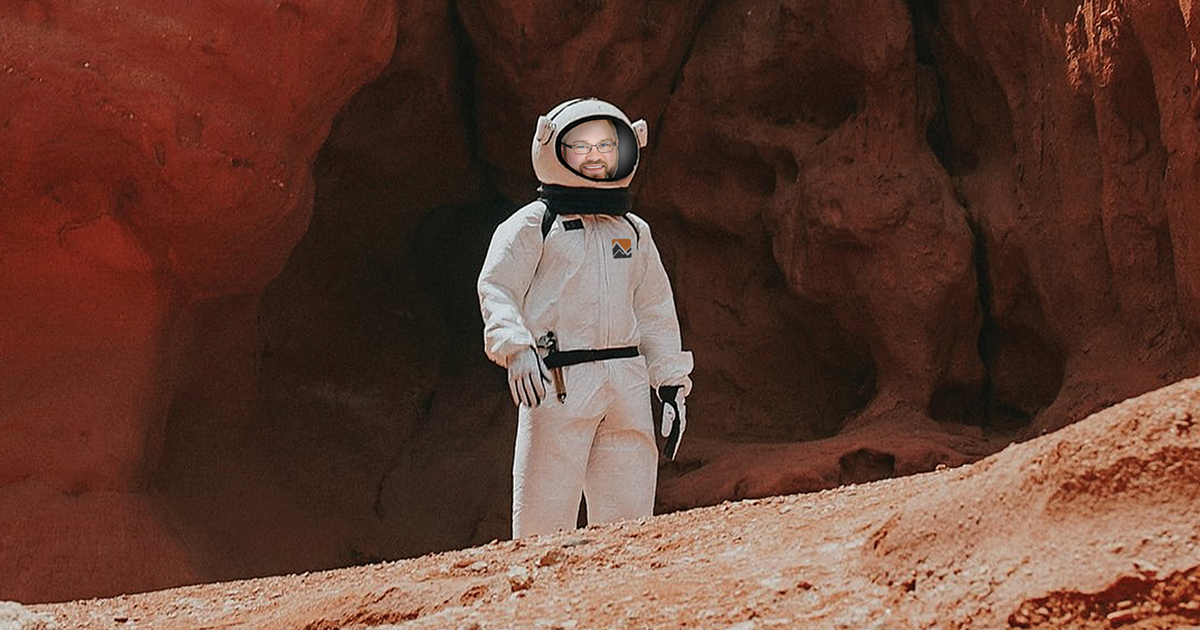Launched by the National Aeronautics and Space Administration (NASA) on July 30, 2020, Perseverance touched down on the Martian surface on February 18, 2021. Designed to look for evidence of past life on the Red Planet, Perseverance is equipped with many technological firsts. In addition to carrying the first off-world helicopter drone, the rover is also equipped with two microphones.
Shortly after landing, these microphones relayed the first audio recordings of sounds from another world. While the microphone designed to capture the landing noises failed to relay its signal, the microphone mounted to the rover’s camera captured some human-made sounds along with the sound of a light Martian wind.
Given the historic significance of this moment, we asked our resident acoustician with interplanetary ambitions for his thoughts on the recordings. We also asked him to imagine what sound he would like to measure if given the opportunity to travel to Mars to perform some very long-distance fieldwork.
What were your first thoughts after listening to the recordings?
When I think of Mars and the wildness of the universe, it is amazing, scary, and pristine. These are similar reactions people would have to the American frontier or entering the wilderness for the first time. Instead of experiencing that otherworldly wilderness, our first audible experience of Mars is anthropogenic noise—the tonal whine of the rover. It reminds me of seeking solitude in nature on Earth, only to hear an airplane cruising overhead at 30,000 feet.
The second thing we can hear in the rover recordings is the wind which isn’t even a sound source. Just as you can’t see the wind, you can’t actually hear the wind. You can only see and hear the effects of the wind. What I believe we heard in the Mars recording was wind interacting with the rover and the microphone. So, I would be more inclined to say that we didn’t go to Mars and record sound; we went to Mars, made noise, and then listened to ourselves. As if the solar system revolves around the Earth and not the Sun.

This illustration depicts NASA's Perseverance rover operating on the surface of Mars. (Source: NASA/JPL-Caltech)
What kinds of Martian sounds would interest you?
I think the question is, what sounds are there on Mars to record other than us? We typically categorize sounds into three groups: anthropogenic (human-made), biogenic (created by a living organism), and geophonic (naturally occurring, but not created by a living organism).
If we went to Mars and recorded biogenic sound, that would really be something! As I discussed above, we went to Mars and recorded anthropogenic sounds. The recording included geophonic phenomenon, but without us there, that sound may not have occurred. I think what we could expect to hear is the sound of wind interacting with the Martian surface, the sound of regolith moving and interacting with itself as the wind causes it to move, and potentially seismic or thermal activity. These would all be fascinating sounds to record on Mars.
More closely related to our work around drone noise is that we may actually get an audio recording of a drone on Mars. It’s interesting that another planet may get more drone action than communities on Earth where we could be doing widespread delivery of medical supplies or last-mile delivery services.
If Elon Musk gave you a round-trip ticket to Mars on a SpaceX rocket, what noise source would you like to comparatively measure on the Red Planet and why?
I think I would like to walk off on my own away from the rocket and any base station, down into a deep crater. Once I got to a deep area with some interesting terrain and steep walls, I would like to play a loud impulsive sound such as a large balloon popping or a gunshot so I could listen to how the sound reacts with the terrain, regolith, and thin atmosphere. We have lots of experiences like this on Earth where we hear sound reverberating through a forest, off rocky slopes of mountains, down in canyons, in concert halls, and off urban landscapes. I think through that impulsive sound we could audibly experience the Martian landscape. Or we might just wake up a deeply burrowed biogenic source—yes, that’s right, space slugs.



